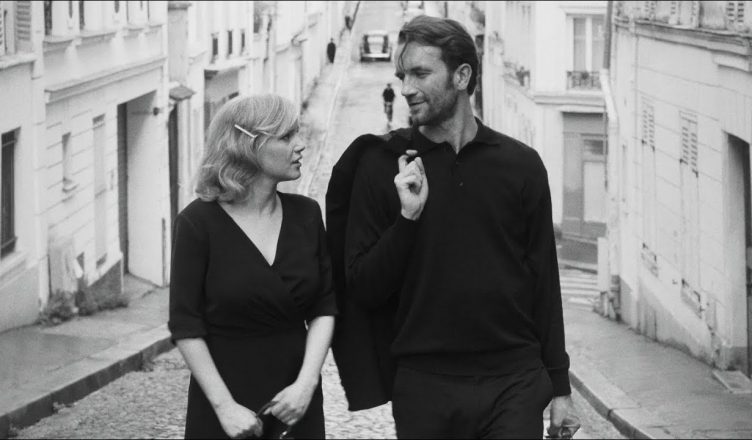Após o excelente drama "Ida" (2015), dirigido pelo cineasta polonês Pawel Pawlikowski, obra com inúmeras premiações, inclusive o Oscar de Melhor Filme Estrangeiro, nos impacta novamente com "Zimma wojna", intitulado no Brasil como "Guerra Fria", exibido na 42 edição da Mostra Internacional de São Paulo.
Inspirado na história de seus pais, ao qual é dedicado o filme, "Guerra Fria" retrata a opressão durante o pós-Segunda Guerra Mundial e década 60 através do conturbado relacionamento amoroso de Wiktor (Tomasz Kot), pianista e compositor, fã de jazz, que trabalha na companhia de música Mazurek Ensemble, e Zula (Joanna Kulling), uma jovem interiorana, tempestuosa com um passado obscuro, que passa a integrar o grupo de artistas que se preparam para uma turnê de performance de música e dança tradiconais polonesas. Mas, no entanto, a companhia se vê forçada, em dado momento, a servir de ferramenta de propaganda stalinista, a qual Wiktor se recusa fazer devido posicionamento político.

Entre encontros e desencontros, a complexa relação dos protagonistas está intrinsecamente ligado ao contexto sociopolítico que ambienta a história e a música, e, à medida que ambos vão se afastando desse cenário hostil, mais devastado torna-se o relacionamento entre os amantes.
Dividido em episódios, o filme traz diálogos mais frios e diretos, até mesmo pela urgência do momento vivido pelas personagens, e a ausência da trilha sonora causa um maior impacto e realismo a obra, mas há música, e essa só é ouvida quando está presente na diegese.

As elípses temporais", sempre interrompidas de forma seca, além de simbolizar um reflexo da própria guerra, intensifica essa atmosfera psicológica das personagens no filme, ao qual o cineasta também dá ao espectador um espaço para interpretar essas lacunas. E a primorosa fotografia em preto e branco, o formato 4:3 da tela, quadrada, e os enquadramentos mais fechados dos protagonistas nas cenas, amplificam essa sensação claustrofóbica, opressora e de vazio em que as personagens se encontram.
"Guerra Fria" é, sem dúvida alguma, um filme belíssimo que destaca-se, ao meu ver, pela estética, a forte presença musical, principalmente das apresentações de músicas tradicionais e folclóricas polonesas, que é um show à parte, e de como o cineasta costura esse elemento a narrativa, a ótima direção de fotografia de Lukasz Zal, que também assinou "Ida", do mesmo diretor, e o maravilhoso "Com Amor, Van Gogh, dos cineastas Doreta Kobiela e Hugh Welchman, a direção certeira de Pawlikowski e as ótimas atuações, em especial de Joanna Kulig, a Zula.
*************************************************************
"Cold War": beyond love in times of war
After the excellent drama "Ida" (2015), directed by Polish filmmaker Pawel Pawlikowski, which won numerous awards, including the Oscar for Best Foreign Language Film, we are once again struck by "Zimma wojna", titled "Cold War" in Brazil, shown at the 42nd São Paulo International Film Festival.
Inspired by the story of his parents, to whom the film is dedicated, "Cold War" portrays oppression during the post-World War II and 1960s through the troubled love relationship of Wiktor (Tomasz Kot), a pianist and composer, a jazz fan, who works for the Mazurek Ensemble music company, and Zula (Joanna Kulling), a tempestuous young country girl with a dark past, who joins the group of artists preparing for a performance tour of traditional Polish music and dance. At one point, however, the company is forced to serve as a tool of Stalinist propaganda, which Wiktor refuses to do because of its political positioning.
Between encounters and disagreements, the complex relationship between the protagonists is intrinsically linked to the socio-political context in which the story and the music are set and, as they both move away from this hostile scenario, the more devastated the relationship between the lovers becomes.
Divided into episodes, the film features colder and more direct dialogues, not least because of the urgency of the moment the characters are experiencing, and the absence of a soundtrack makes the work more impactful and realistic, but there is music, and it is only heard when it is present in the diegesis.
The time ellipses, always interrupted in a dry manner, as well as symbolizing a reflection of the war itself, intensify the psychological atmosphere of the characters in the film, in which the filmmaker also gives the viewer a space to interpret these gaps. And the exquisite black and white photography, the 4:3 format of the square screen and the close-ups of the protagonists in the scenes amplify this claustrophobic, oppressive and empty feeling in which the characters find themselves.
"Cold War" is undoubtedly a beautiful film that stands out, in my opinion, for its aesthetics, the strong musical presence, especially the performances of traditional Polish folk music, which is a show apart, and how the filmmaker sews this element into the narrative, the excellent cinematography by Lukasz Zal, who also directed "Ida", by the same director, and the wonderful "Love, Van Gogh", by filmmakers Doreta Kobiela and Hugh Welchman, Pawlikowski's precise direction and the excellent performances, especially by Joanna Kulig as Zula.

